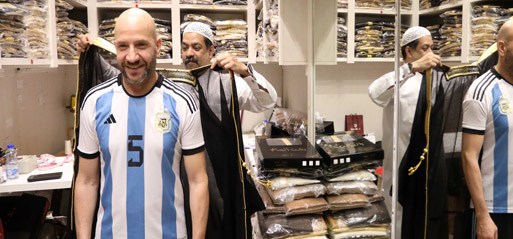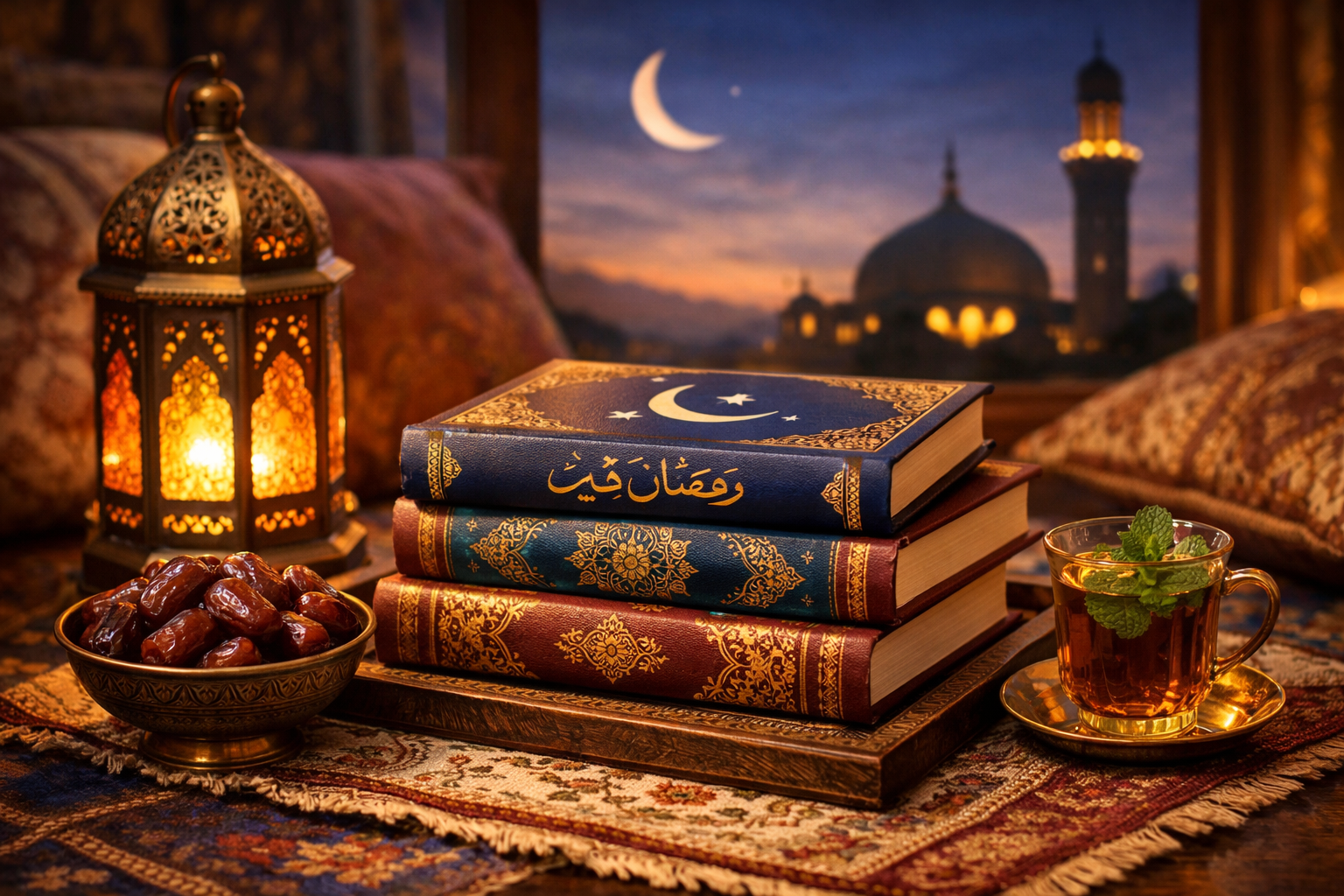
An Argentina fan tries on a “Bisht” cloak at Souq Waqif Bazaar in Doha, Qatar, on December 21, the traditional Arab world cloak worn by Argentina football team captain Lionel Messi during the FIFA World Cup 2022 award ceremony. (Credit:Ashraf Amra/Anadolu Agency)
Football, the most played and watched sport on the planet, second only to the Olympics in popularity, is recognised for its power to unite regardless of age, race, gender, or ethnicity, and this is never more evident than during the World Cup.
The Premier League in England, an incredible melting pot of no less than 65 nationalities, is a good illustration of how uniting football can be. As seen by the symbolic action of “taking the knee” before kickoff, a tradition that dates back to the 1960s civil rights movement in the US, the England FA has led the fight against racism.
Regardless of how corrupt Fifa has been, the World Cup has served as a unifying force, bringing many different cultures together. The plan is to widen the participation from 36 to 48 countries for the next World Cup. It simply begs the question of why, given that Qatar was picked as a destination a decade ago, Western nations have reserved this month to showcase their self-righteous opposition against the host nation.
HOSTILE BBC COVERAGE
From the outset, the BBC deliberately set a hostile and disrespectful tone by unprecedentedly not broadcasting the opening ceremony (which included a recitation of the Qur’an) on its terrestrial station despite the World Cup being held for the first time in a Muslim Arab country.
Instead, viewers were treated to the publicly financed corporation’s highest-paid presenter, Gary Lineker, launching into a highly charged political monologue on migrant rights, with no reference to the festering anti-immigrant hate stoked by the media back home, or his own multi-million-pound presenting gig with Qatar-owned Al-Jazeera.
British etiquette is renowned for its tolerance and focuses on courteous manners, which emphasise respect for others, particularly the hosts. Foreign Secretary, James Cleverly, keenly reminded travelling England and Wales fans to practise that etiquette, a reminder, unfortunately, unheeded by the hypocritical travelling press pack and Labour Leader Sir Keir Starmer, who urged for a boycott of the first World Cup hosted in the Middle East.
Of all people, it was left to outspoken ITV presenter Piers Morgan to be the voice of reason, expressing his disdain for the BBC’s ‘virtue signalling.’
Such was the deluge of sickening selective moral outrage that Fifa’s Swiss-Italian President, Gianni Infantino, accused the West of racism and double standards (see p. 5), and the media of ‘spitting’ on the hosts. It is Europe, he suggested, that “should be apologising for “the next 3,000 years before giving moral lessons,” referring indirectly to the obscene yet often unspoken centuries of colonialism.
His retort did not deter a small group of fans from arriving in Doha dressed provocatively as Christian crusaders. The BBC’s leading female sports presenter, Gabby Logan, could not help but accuse Iran of cheating (‘let’s call it sportsmanship’) after defeating Wales.
It was a theme taken up in an extraordinary outburst by former German player Jürgen Klinsmann, who launched a truly astonishing diatribe about how it was “in their culture” to cheat and extended his attack to include Iran’s experienced Portuguese manager, Carlos Queiroz, as “fitting in well” with that culture.
His xenophobic tirade prompted the Iranian football federation to call for his resignation from the FIFA Technical Study Group, designed to provide cutting-edge analysis for all the games at the tournament.
Even when presented with the opportunity to apologise on air a couple of days later, the German declined. Instead, he chose to be dismissive of his racist taunt by claiming Iran was holding a grudge against him due to his time as manager of the US team.
The prevailing attitude toward the tournament being held in Qatar was centred on non-football issues, the vast majority of which were orchestrated.
The issue of trying to enforce the LGBTQ+ solidarity One-Love armband on players was in direct contravention of Fifa rules yet the hostility generated was against the host country. It is ironic then, that the western press conveniently overlooked the torrent of support expressed for the dispossessed Palestinians on social media and the ground, as frequently demonstrated by the unexpected success of Morocco in unfurling their flag at the end of their matches.
Suffice it to say, it was largely the success of the way games were played and organised by the small Muslim Arab state that the World Cup once again proved unique despite much of the initial hostility. Fifa chief Giovanni Infantino praised the tournament as “the best ever,” an opinion shared by fans, many of whom Western, on the ground.
Infantino spoke of the “unique, cohesive power that this World Cup has shown” and what might be called the “transformative legacy” of it being staged in Qatar.
Among others, England cricket great Kevin Pietersen even suggested that every football tournament should be held in the Middle East after attending the World Cup. As a way to contrast the family-friendly way it was staged in Doha, he posted a video on Instagram of the chaos, hooliganism, and violent fans at last year’s European Championship final in Wembley.
The lasting memory of the World Cup in Qatar includes many things; the emergence of Lionel Messi, arguably the greatest player ever, draped in the Emir’s [bisht] cloak lifting his long-awaited first title following the most dramatic final ever. For many people, particularly those in the southern hemisphere, the Moroccan team’s emergence as a symbol of regional, religious, and continental unity will be long remembered, the opposite of the way they were featured as monkeys on Danish TV.
Football can break down barriers, as shown by Egypt’s Mohammed Salah’s epic rise to stardom in Liverpool. Wearing his religion on his sleeve led to such chants of “If he scores another few (goals), then I’ll be Muslim too.”
So many Muslim players are embedded in the Premier League to overcome the cultural stigma that unfortunately was used by broadcasters and the press alike to try to make Qatar what Lineker originally described as the “most controversial World Cup in history” even before a ball had been kicked.
“Football banter” can sometimes denigrate the sport; in the case of Qatar 2022, it is weaponised to summon the colonial “white man’s burden” to educate and dictate to the “uncivilised.” Yet it could even be argued that the success of holding the tournament made some progress in the long, moribund Middle East peace process.
Although Israel did not qualify, airways were uniquely opened for direct flights from Tel Aviv to Doha to facilitate the attendance of both Israeli and Palestinian fans. Raising the Palestinian flag and lobbying for their right to return to their homeland must no longer be considered taboo if regional ties with Israel are to be normalised after 75 years.
As a postscript, the slaying of 23-year-old Palestinian football player Ahmad Daraghmeh by Israeli troops in a raid in the occupied West Bank two days after the World Cup final is one of the latest confirmations that nothing has changed.
READ MORE
Qatar selectively condemned during World Cup
Morocco not Messi, the lasting story of Qatar2022


